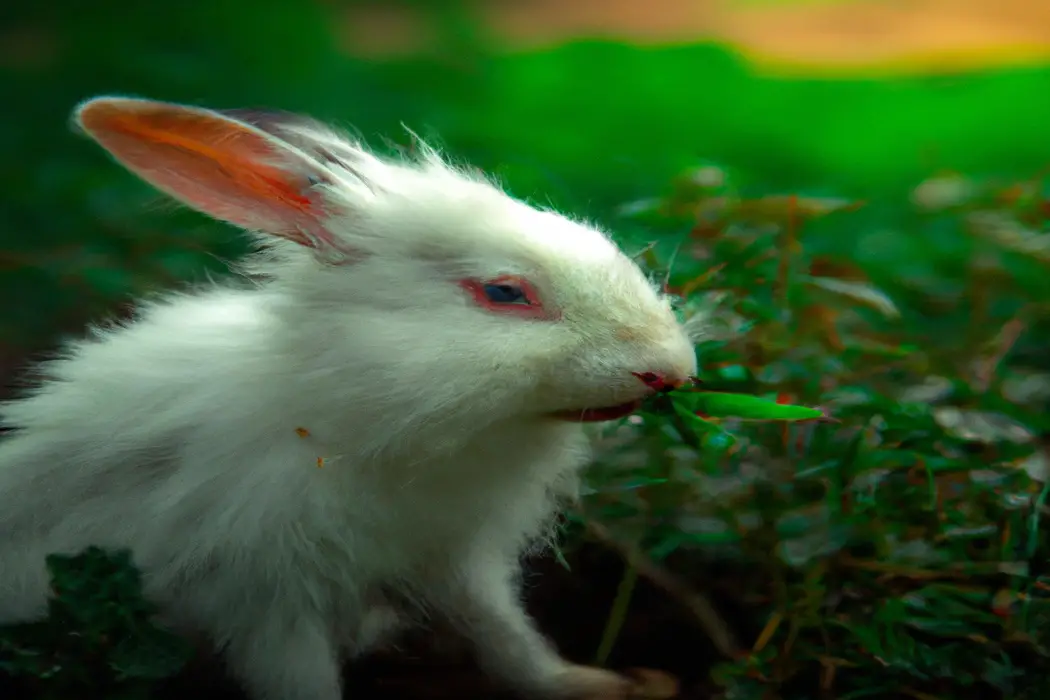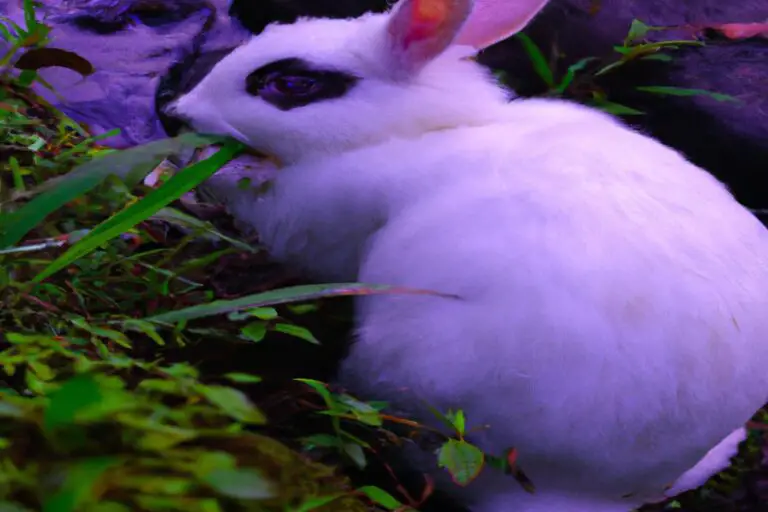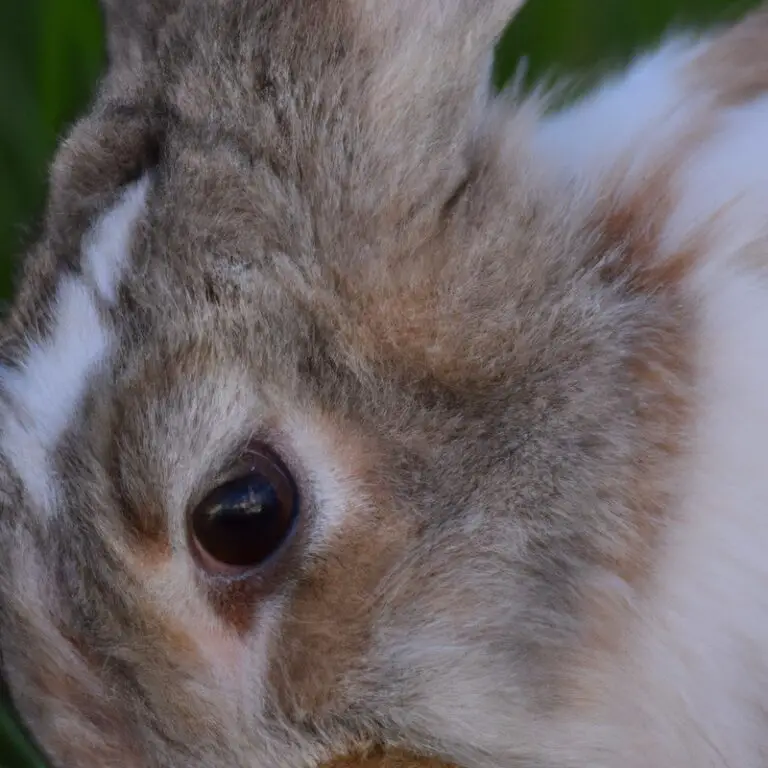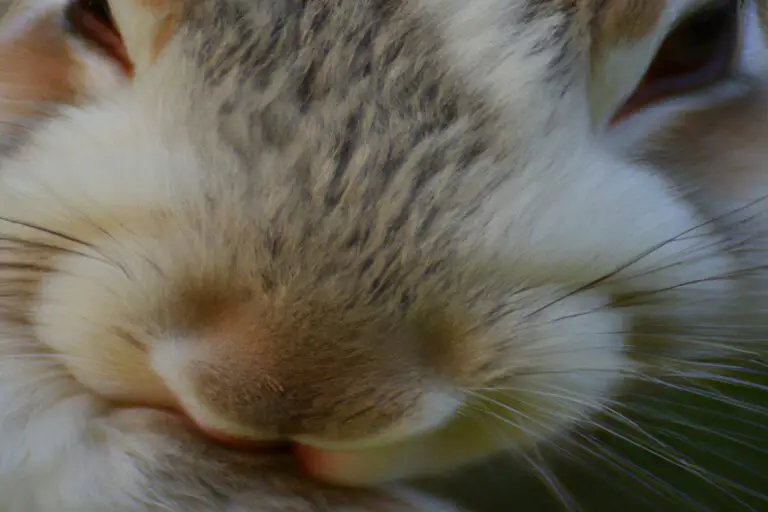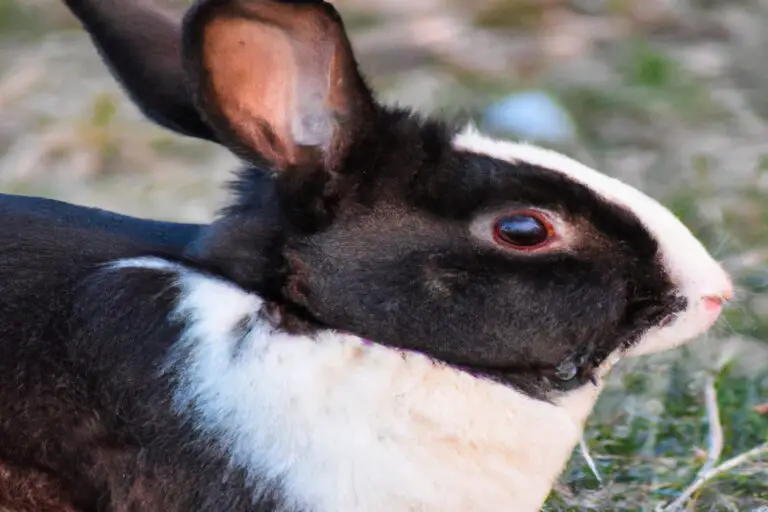How To Keep Rabbits Away From Tulips – Naturally!
Key Takeaways:
- Planting deer-resistant flowers alongside your tulips can help deter rabbits from approaching.
- Creating a physical barrier, such as a fence or mesh, can effectively prevent rabbits from accessing your tulips.
- Using natural deterrents like garlic or blood meal can discourage rabbits from munching on your tulips.
- Regularly inspecting and removing any rabbit droppings or signs can help prevent future damage to your tulips.
Do you dream of a vibrant garden filled with beautiful tulips?
Well, picture this: rows of colorful petals dancing in the sunlight, creating a breathtakingly stunning sight.
But wait a minute, what’s that lurking in the shadows?
Rabbits! These adorable creatures may be charming, but they can wreak havoc on your precious tulips.
Not to worry, my friend, for I have the perfect solution to keep those pesky rabbits at bay.
In this article, I will share expert tips and natural remedies to protect your tulips from these furry invaders.
Say goodbye to nibbled petals and hello to a flourishing tulip paradise!
| Methods | Effectiveness | Pros | Cons |
|---|---|---|---|
| 1. Fence | High | – Provides a physical barrier\n- Prevents rabbits from accessing tulips | – Requires installation\n- May alter the appearance of the garden |
| 2. Natural repellents | Medium | – Environmentally friendly\n- Safe for other plants | – May need frequent reapplication\n- Effectiveness may vary |
| 3. Scare tactics | Low | – Inexpensive\n- Easy to implement | – Limited effectiveness\n- May only provide temporary relief |
| 4. Plant deterrents | Medium | – Certain plants repel rabbits\n- Adds variety to the garden | – Requires planning and maintenance\n- May not be 100% effective |
| 5. Trapping and relocation | High | – Removes rabbits from the area | – Requires trapping skills\n- May not be suitable for everyone |
Why are rabbits a problem for tulips?
Rabbits are a problem for tulips because they have a tendency to eat the tulip plants and flowers.
Rabbit behavior and feeding habits
Rabbits are herbivores, meaning they only eat plant material. They have a diverse diet, munching on grass, clover, wildflowers, vegetables, and even tree bark.
Their feeding habits can be problematic for tulips because rabbits find the tender leaves and petals of tulip plants particularly appealing.
They will nibble on the foliage and flowers, which can stunt the growth or even kill the plants. It’s important to take measures to protect your tulips if you have a rabbit problem in your area.
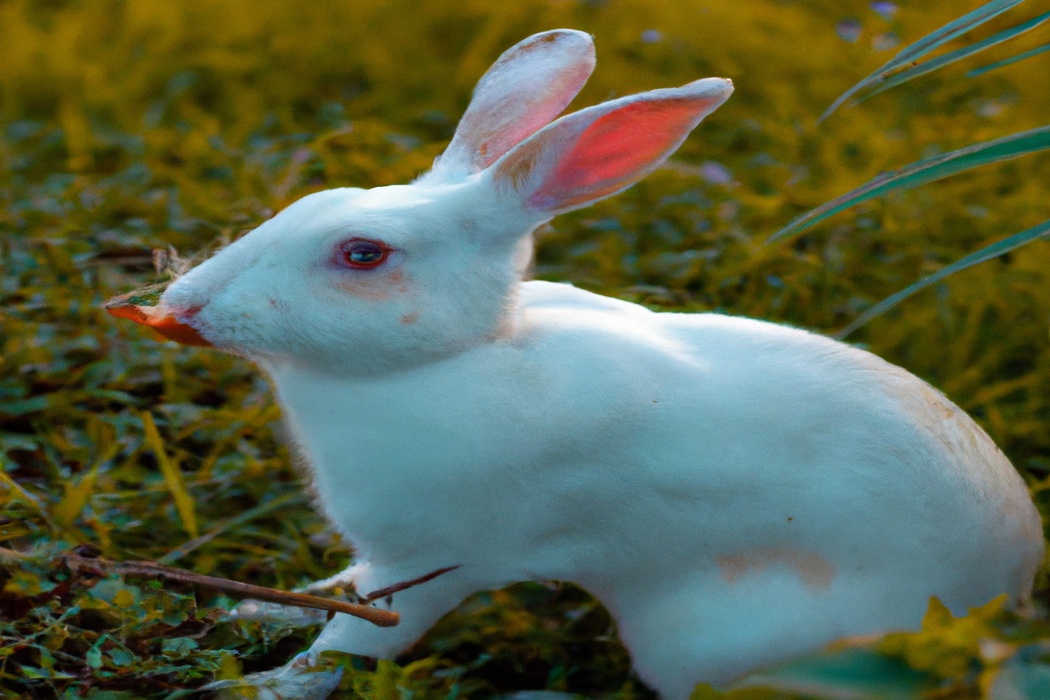
Damage caused by rabbits to tulips
Rabbits can cause significant damage to tulips.
They have a strong appetite for tulip leaves and flowers, which they will eat if given the chance.
This can result in the destruction of the entire plant, leaving behind only bare stems.
Rabbits are also known to dig and burrow around tulip bulbs, disturbing their growth and potentially causing them to rot or fail to bloom.
To protect your tulips from rabbit damage, it’s important to implement effective preventative measures.
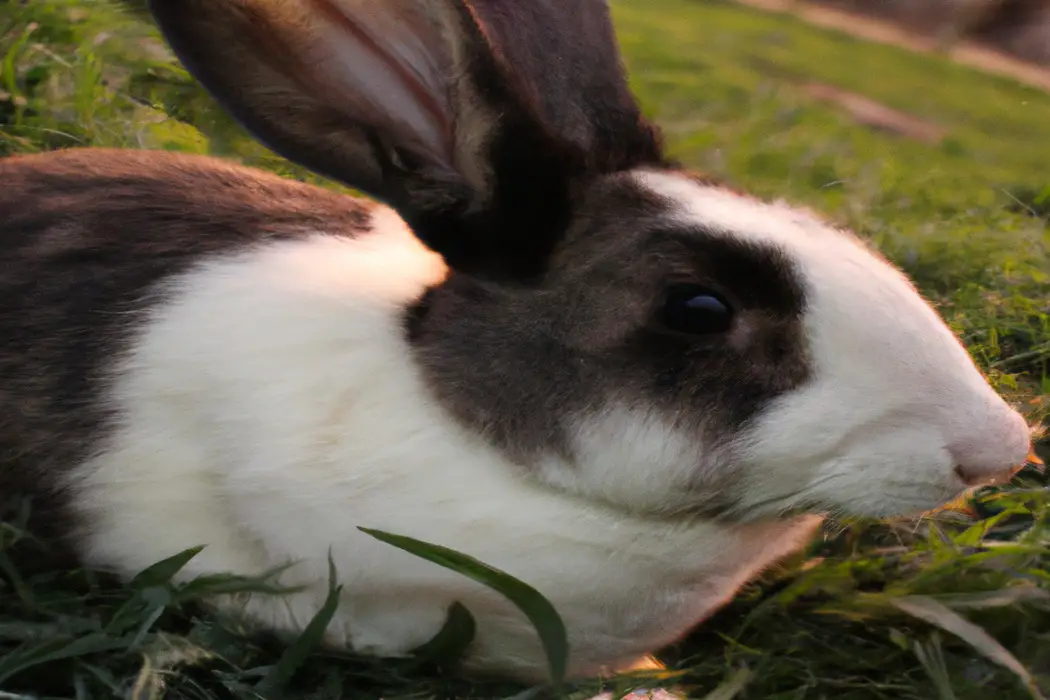
Natural ways to deter rabbits from tulips
Plant rabbit-resistant flowers alongside your tulips.
Planting rabbit-resistant flowers alongside tulips
To keep rabbits away from your tulips, try planting rabbit-resistant flowers alongside them.
These flowers have a scent or taste that rabbits find unappealing.
Some good options include marigolds, lavender, daffodils, and hyacinths.
Not only will these flowers help deter rabbits, but they will also add beauty to your garden.
Remember to choose flowers that are compatible with tulips in terms of sunlight and watering requirements.
Plant them strategically around your tulips to create a less desirable environment for rabbits.
Using odor repellents
Using odor repellents is an effective way to keep rabbits away from your tulips.
The strong smells of certain substances are known to repel rabbits.
You can try using natural repellents such as garlic, onions, or pepper flakes.
Simply sprinkle these around your tulips to create a barrier that rabbits will want to avoid.
Another option is to use commercial repellents made specifically for deterring rabbits.
These often contain ingredients that emit strong odors that rabbits find unpleasant.
Place these repellents near your tulips to keep rabbits at bay.
Creating physical barriers
Creating physical barriers is an effective way to keep rabbits away from your tulips. Here are some options to consider:
- Fence: Install a fence around your tulip bed to create a physical barrier that rabbits cannot easily bypass.
- Netting: Use bird netting or wire mesh to cover your tulip bed. Make sure the netting is securely fastened to prevent rabbits from accessing the flowers.
- Raised beds: Plant your tulips in raised beds to make it more difficult for rabbits to reach them. The higher elevation can act as a deterrent.
- Chicken wire cages: Build cages using chicken wire or hardware cloth around individual tulip plants. This will provide protection from rabbits without hindering the plants’ growth.
Remember to regularly inspect your barriers for any gaps or damage, and make necessary repairs to ensure their effectiveness.
Encouraging natural predators
Encouraging natural predators is a great way to keep rabbits away from your tulips. Predators like foxes, owls, and hawks can help control the rabbit population in your garden.
Here are a few ways to attract these predators:
- Create a welcoming habitat: Providing shelter, such as brush piles or nesting boxes, can attract predators to your garden.
- Plant native vegetation: Native plants can attract insects and small animals, which then serve as food for predators.
- Install perching and roosting spots: Adding perches or nesting platforms can attract birds of prey like owls and hawks.
- Reduce pesticide use: Pesticides can harm predators and disrupt the natural balance in your garden, so try using organic and natural pest control methods instead.
- Avoid chemicals with strong odors: Some chemicals repel predators, so opt for unscented or lightly scented products.
Remember, encouraging natural predators is just one piece of the puzzle. Combining multiple strategies will give you the best chance of keeping rabbits away from your tulips.

Homemade remedies to keep rabbits away from tulips
Try homemade remedies like chili pepper spray, garlic spray, vinegar solution, or blood meal to keep rabbits away from your tulips.
Chili pepper spray
Chili pepper spray can be an effective homemade remedy to keep rabbits away from your tulips. To make the spray, mix water and chili pepper flakes in a spray bottle.
The strong scent and taste of the pepper will deter rabbits from eating your tulips.
Remember to reapply the spray after rain or watering your plants. However, it’s important to wear gloves and avoid contact with your eyes or mouth when handling the chili pepper spray.
Garlic spray
Garlic spray is a natural and effective way to keep rabbits away from your tulips. To make the spray, mix a few cloves of crushed garlic with water and let it steep overnight.
Then, strain the mixture and transfer it to a spray bottle.
Spray the garlic mixture onto the leaves and around the base of your tulips to create a strong smell that rabbits find repelling. Reapply the spray every few days, especially after rainfall, to maintain its effectiveness.
Remember to avoid spraying the flowers directly to prevent damage.
Vinegar solution
Vinegar is an effective homemade remedy to keep rabbits away from tulips.
Mix equal parts of white vinegar and water in a spray bottle.
Spray the solution on and around the tulips, focusing on the areas where rabbits are likely to approach.
The strong odor of vinegar acts as a deterrent and helps to keep the rabbits at bay.
Reapply the solution every few days or after rainfall to maintain its effectiveness.
Blood meal
Blood meal is a natural deterrent for rabbits that can help keep them away from your tulips. It is a fertilizer made from dried animal blood, often from cows.
The strong smell of blood meal acts as a repellent for rabbits, making them less likely to nibble on your flowers.
To use blood meal, simply sprinkle it around your tulip bulbs or on the soil surface. Be sure to follow the instructions on the packaging for the recommended amount.
It’s important to note that blood meal should not be used near water sources or in areas with a high risk of flooding, as it can contribute to water pollution.
Additional measures to protect tulips from rabbits
To further safeguard your tulips from rabbits, consider these extra precautions: maintain your garden regularly, eliminate potential habitats, and explore scaring techniques.
Regular garden maintenance
Regular garden maintenance is essential to keep your tulips and other plants healthy and free from pests. Here are some simple tasks you can do to maintain your garden:
- Watering: Regularly water your tulips, but avoid overwatering as it can cause rot. Check the soil moisture and water accordingly.
- Weeding: Remove weeds regularly to prevent them from stealing nutrients from your tulips. Use a hand tool or pull them out by hand.
- Mulching: Apply a layer of mulch around your tulips to prevent weed growth, conserve moisture, and regulate soil temperature.
- Fertilizing: Feed your tulips with a balanced fertilizer during their active growth period, following the package instructions for application rates.
- Pruning: Remove dead or damaged leaves and flowers from your tulips. This helps maintain their overall appearance and prevents diseases.
- Pest control: Monitor your garden for pests like rabbits and take appropriate measures to protect your tulips. Use physical barriers, repellents, or natural deterrents.
By regularly tending to these tasks, you can ensure the health and vitality of your tulips while enjoying a beautiful and thriving garden.
Removing potential habitats
To remove potential habitats that attract rabbits to your tulips, there are a few simple steps you can take. First, clear away any brush or dense vegetation around your tulip beds, as this provides hiding spots for rabbits.
Second, keep your lawn well-maintained by regularly mowing and removing excessive vegetation.
Rabbits are less likely to stay in areas without cover. Third, consider using fencing or barriers around your tulip beds to physically prevent rabbits from accessing them.
Remember, by removing these potential habitats, you can help keep rabbits away from your tulips.
Scaring techniques
Scaring techniques can be effective in keeping rabbits away from your tulips. One method is to use noise, such as wind chimes or a motion-activated sprinkler system.
The sudden sound and movement will startle the rabbits and deter them from approaching your plants.
Other options include placing scarecrows or fake predators, like owls or snakes, near your tulips. The sight of these objects can intimidate rabbits and discourage them from getting too close.
Additionally, you can use strong-smelling deterrents, like vinegar or garlic, to repel rabbits from your garden.
Frequently Asked Questions
How effective are rabbit-resistant flowers?
Rabbit-resistant flowers can be effective in deterring rabbits from devouring your tulips. These flowers typically have a strong aroma, bitter taste, or tough texture that rabbits find unpalatable.
Examples include daffodils, hyacinths, and alliums.
However, it’s important to note that no flower is completely foolproof. If rabbits are particularly hungry or desperate, they may still nibble on your tulips.
Combination strategies, such as fencing or repellents, can enhance the effectiveness of rabbit-resistant flowers.
Regular monitoring and quick action are also key to protecting your tulips.
How often should I apply homemade remedies?
When it comes to applying homemade remedies to keep rabbits away from your tulips, it’s important to consider the frequency.
You should apply the remedies consistently, especially after rain or when you notice signs of rabbit activity.
Applying them every 1-2 weeks should be sufficient to deter rabbits.
However, keep in mind that each remedy may have different effectiveness and longevity, so observe your plants and adjust the application frequency accordingly.
Can I use commercial rabbit repellents?
Yes, you can use commercial rabbit repellents to keep rabbits away from your tulips.
Commercial rabbit repellents are specifically designed to deter rabbits from your garden and protect your plants.
These repellents usually contain natural or chemical substances that emit smells or tastes that rabbits find unpleasant.
They are easy to use and can be sprayed directly onto your tulips or applied around the area to create a barrier.
Make sure to follow the instructions on the product label for best results.
Are there any plants that attract rabbits away from tulips?
Yes, there are certain plants that can attract rabbits away from your tulips. Some plants that rabbits find more appealing than tulips include clover, grass, dandelions, and lettuce.
If you plant these types of plants in your garden, rabbits may be more likely to focus on them instead of your prized tulips.
Additionally, creating a barrier around your tulips with fencing or using repellents specifically designed for rabbits can also help deter them from nibbling on your tulips.
Do scare devices work in keeping rabbits away?
Scare devices can be effective in keeping rabbits away from your tulips.
These devices, such as motion-activated sprinklers or noise-making devices, can startle and deter rabbits from entering your garden.
By creating a sense of danger or unpredictability, scare devices can help discourage rabbits from munching on your tulips.
However, it’s important to note that rabbits may eventually become accustomed to these devices, so it’s a good practice to mix things up every once in a while to keep them on their toes.
Final Verdict
Rabbits can be a significant problem for tulips due to their behavior and feeding habits, which can result in considerable damage to these delicate flowers.
However, there are various natural ways to deter rabbits from tulips, such as planting rabbit-resistant flowers alongside them, using odor repellents, creating physical barriers, and encouraging natural predators.
Homemade remedies like chili pepper spray, garlic spray, vinegar solution, and blood meal can also be effective in keeping rabbits away.
Additionally, regular garden maintenance, removing potential habitats, and utilizing scare techniques can provide added protection.
Overall, by implementing these measures, you can enjoy beautiful and undisturbed tulips without the hassle of rabbits.

